#gig economy
Text
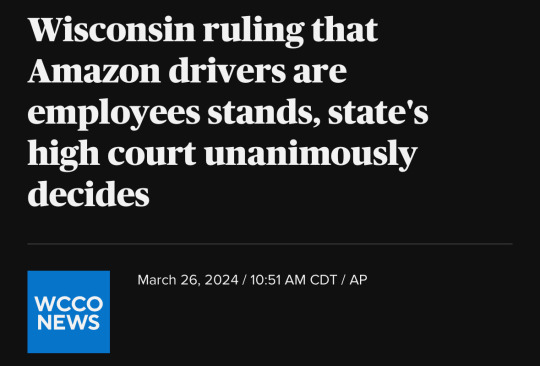


A win for gig workers.
This ruling may have a rippling effect across the country
#capitalism#good news#news#current events#government#politics#us politics#the left#progressive#activism#Amazon#workers#workers rights#gig economy
3K notes
·
View notes
Text
When the app tries to make you robo-scab
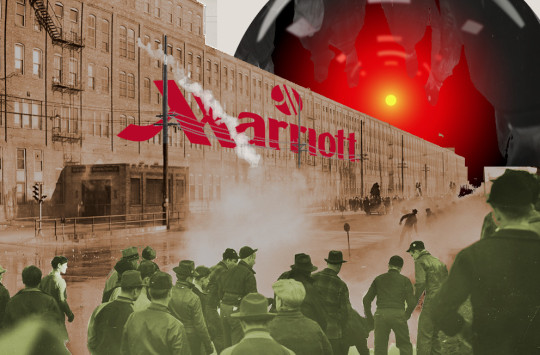
When we talk about the abusive nature of gig work, there’s some obvious targets, like algorithmic wage discrimination, where two workers are paid different rates for the same job, in order to trick occasional gig-workers to give up their other sources of income and become entirely dependent on the app:
https://pluralistic.net/2023/04/12/algorithmic-wage-discrimination/#fishers-of-men
Then there’s the opacity — imagine if your boss refused to tell you how much you’ll get paid for a job until after you’ve completed it, claimed that this was done in order to “protect privacy” — and then threatened anyone who helped you figure out the true wage on offer:
https://pluralistic.net/2021/08/07/hr-4193/#boss-app
Opacity is wage theft’s handmaiden: every gig worker producing content for a social media algorithm is subject to having their reach — and hence their pay — cut based on the unaccountable, inscrutable decisions of a content moderation system:
https://pluralistic.net/2022/12/10/e2e/#the-censors-pen
Making content for an algorithm is like having a boss that docks every paycheck because you broke rules that you are not allowed to know, because if you knew the rules, you’d figure out how to cheat without your boss catching you. Content moderation is the last place where security through obscurity is considered good practice:
https://doctorow.medium.com/como-is-infosec-307f87004563
When workers seize the means of computation, amazing things happen. In Indonesia, gig workers create and trade tuyul apps that let them unilaterally modify the way that their bosses’ systems see them — everything from GPS spoofing to accessibility mods:
https://pluralistic.net/2021/07/08/tuyul-apps/#gojek
So the tech and labor story isn’t wholly grim: there are lots of ways that tech can enhance labor struggles, letting workers collaborate and coordinate. Without digital systems, we wouldn’t have the Hot Strike Summer:
https://pluralistic.net/2022/12/02/not-what-it-does/#who-it-does-it-to
As the historic writer/actor strike shows us, the resurgent labor movement and the senescent forces of crapulent capitalism are locked in a death-struggle over not just what digital tools do, but who they do it for and who they do it to:
https://locusmag.com/2022/01/cory-doctorow-science-fiction-is-a-luddite-literature/
When it comes to the epic fight over who technology acts for and against, we need a diversity of tactics, backstopped by tech operated by and for its users — and by laws that protect workers and the public. That dynamic is in sharp focus in UNITE Here Local 11’s strike against Orange County’s Laguna Cliffs Marriott Resort & Spa.
The UNITE Here strike turns on the usual issues like a living wage (hotel staff are paid so little they have to rent rooming-house beds by the shift, paying for the right to sleep in a room for a few hours at a time, without any permanent accommodation). They’re also seeking health-care and pensions, so they can be healthy at work and retire after long service. Finally, they’re seeking their employer’s support for LA’s Responsible Hotels Ordinance, which would levy a tax on hotel rooms to help pay for hotel workers’ housing costs (a hotel worker who can’t afford a bed is the equivalent of a fast food worker who has to apply for food stamps):
https://www.unitehere11.org/responsible-hotels-ordinance/
But the Marriott — which is owned by the University of California and managed by Aimbridge Hospitality — has refused to bargain, walking out negotiations.
But the employer didn’t walk out over wages, benefits or support for a housing subsidy. They walked out when workers demanded that the scabs that the company was trying to hire to break the strike be given full time, union jobs.
These aren’t just any scabs, either. They’re predominantly Black workers who rely on the $700m Instawork app for gigs. These workers are being dispatched to cross the picket line without any warning that they’re being contracted as strikebreakers. When workers refuse the cross the picket and join the strike, Instawork cancels all their shifts and permanently blocks them from new jobs.
This is a new, technologically supercharged form of illegal strikebreaking. It’s one thing for a single boss to punish a worker who refuses to scab, but Instawork acts as a plausible-deniability filter for all the major employers in the region. Like the landlord apps that allow landlords to illegally fix rents by coordinating hikes, Instawork lets bosses illegally collude to rig wages by coordinating a blocklist of workers who refuse to scab:
https://arstechnica.com/tech-policy/2022/10/company-that-makes-rent-setting-software-for-landlords-sued-for-collusion/?comments=1
The racial dimension is really important here: the Marriott has a longstanding de facto policy of refusing to hire Black workers, and whenever they are confronted with this, they insist that there are no qualified Black workers in the labor pool. But as soon as the predominantly Latino workforce struck, Marriott discovered a vast Black workforce that it could coerce into scabbing, in collusion with Instawork.
Now, all of this isn’t just sleazy, it’s illegal, a violation of Section 7 of the NLRB Act. Historically, that wouldn’t have mattered, because a string of presidents, R and D, have appointed useless do-nothing ghouls to run the NLRB. But the Biden admin, pushed by the party’s left wing, made a string of historic, excellent appointments, including NLRB General Counsel Jennifer Abruzzo, who has set her sights on punishing gig work companies for flouting labor law:
https://pluralistic.net/2022/01/10/see-you-in-the-funny-papers/#bidens-legacy
UNITE HERE 11 has brought a case to the NLRB, charging the Instawork, the UC system, Marriott, and Aimbridge with violating labor law by blackmailing gig workers into crossing the picket line. The union is also asking the NLRB to punish the companies for failing to protect workers from violent retaliation from the wealthy hotel guests who have punched them and screamed epithets at them. The hotel has refused to identify these thug guests so that the workers they assaulted can swear out complaints against them.
Writing about the strike for Jacobin, Alex N Press tells the story of Thomas Bradley, a Black worker who was struck off all Instawork shifts for refusing to cross the picket line and joining it instead:
https://jacobin.com/2023/07/southern-california-hotel-workers-strike-automated-management-unite-here
Bradley’s case is exhibit A in the UNITE HERE 11 case before the NLRB. He has a degree in culinary arts, but racial discrimination in the industry has kept him stuck in gig and temp jobs ever since he graduated, nearly a quarter century ago. Bradley lived out of his car, but that was repossessed while he slept in a hotel room that UNITE HERE 11 fundraised for him, leaving him homeless and bereft of all his worldly possessions.
With UNITE HERE 11’s help, Bradley’s secured a job at the downtown LA Westin Bonaventure Hotel & Suites, a hotel that has bargained with the workers. Bradley is using his newfound secure position to campaign among other Instawork workers to convince them not to cross picket lines. In these group chats, Jacobin saw workers worrying “that joining the strike would jeopardize their standing on the app.”

Today (July 30) at 1530h, I’m appearing on a panel at Midsummer Scream in Long Beach, CA, to discuss the wonderful, award-winning “Ghost Post” Haunted Mansion project I worked on for Disney Imagineering.

If you'd like an essay-formatted version of this thread to read or share, here's a link to it on pluralistic.net, my surveillance-free, ad-free, tracker-free blog:
https://pluralistic.net/2023/07/30/computer-says-scab/#instawork

[Image ID: An old photo of strikers before a struck factory, with tear-gas plumes rising above them. The image has been modified to add a Marriott sign to the factory, and the menacing red eye of HAL9000 from Stanley Kubrick's '2001: A Space Odyssey' to the sky over the factory. The workers have been colorized to a yellow-green shade and the factory has been colorized to a sepia tone.]

Image:
Cryteria (modified)
https://commons.wikimedia.org/wiki/File:HAL9000.svg
CC BY 3.0
https://creativecommons.org/licenses/by/3.0/deed.en
#pluralistic#hot strike summer#unions#UNITE HERE#labor#computer says no#tuyul apps#jacobin#gig economy#nlrb#marriott#Laguna Cliffs Marriott Resort & Spa#instawork#scabs#Aimbridge Hospitality Group#University of California#nlrb section 7#unfair labor practice#ulp#UNITE HERE Local 11#mansion tax#race#algorithmic wage discrimination#Veena Dubal#disciplinary technology#chickenized reverse-centaurs#reverse-centaurs#como is infosec#Jennifer Abruzzo
1K notes
·
View notes
Text
After nearly 15 years, Uber claims it’s finally turned an annual profit. Between 2014 and 2023, the company set over $31 billion on fire in its quest to drive taxi companies out of business and build a global monopoly. It failed on both fronts, but in the meantime it built an organization that can wield significant power over transportation — and that’s exactly how it got to last week’s milestone.
Uber turned a net profit of nearly $1.9 billion in 2023, but what few of the headlines will tell you is that over $1.6 billion of it came from unrealized gains from its holdings in companies like Aurora and Didi. Basically, the value of those shares are up, so on paper it looks like Uber’s core business made a lot more money than it actually did. Whether the companies are really worth that much is another question entirely — but that doesn’t matter to Uber. At least it’s not using the much more deceptive “adjusted EBITDA” metric it spent years getting the media to treat as an accurate picture of its finances.
Don’t be fooled into thinking the supposed innovation Uber was meant to deliver is finally bearing fruit. The profit it’s reporting is purely due to exploitative business practices where the worker and consumer are squeezed to serve investors — and technology is the tool to do it. This is the moment CEO Dara Khosrowshahi has been working toward for years, and the plan he’s trying to implement to cement the company’s position should have us all concerned about the future of how we get around and how we work.
[...]
Uber didn’t become a global player in transportation because it wielded technology to more efficiently deliver services to the public. The tens of billions of dollars it lost over the past decade went into undercutting taxis on price and drawing drivers to its service — including some taxi drivers — by promising good wages, only to cut them once the competition posed by taxis had been eroded and consumers had gotten used to turning to the Uber app instead of calling or hailing a cab.
As transport analyst Hubert Horan outlined, for-hire rides are not a service that can take advantage of economies of scale like a software or logistics company, meaning just because you deliver more rides doesn’t mean the per-ride cost gets significantly cheaper. Uber actually created a less cost-efficient model because it forces drivers to use their own vehicles and buy their own insurance instead of having a fleet of similar vehicles covered by fleet insurance. Plus, it has a ton of costs your average taxi company doesn’t: a high-paid tech workforce, expensive headquarters scattered around the world, and outrageously compensated executive management like Khosrowshahi, just to name a few.
How did Uber cut costs then? By systematically going after the workers that deliver its service. More recently, it took advantage of the cost-of-living crisis to keep them on board in the same way it exploited workers left behind by the financial crisis in the years after its initial launch. Its only real innovation is finding new ways to exploit labor.
385 notes
·
View notes
Text
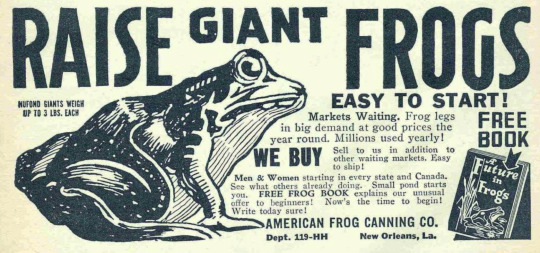
Raise Giant Frogs - Easy to start!
American Frog Canning Co.
906 notes
·
View notes
Text
The US Department of Labor (DOL) published a final rule to the Federal Register on Wednesday that would increase the difficulty of classifying workers as independent contractors. If the rule survives court challenges unscathed, it will replace a business-friendly Trump-era regulation that did the opposite. It’s scheduled to go into effect on March 11.
The new rule, first proposed in 2022, could have profound implications for companies like Uber and DoorDash that rely heavily on gig workers. It would mandate that workers who are “economically dependent” on a company be considered employees.
The rule restores a pre-Trump precedent of using six factors to determine workers’ classification. These include their opportunity for profit or loss, the financial stake and nature of resources the worker has invested in the work, the work relationship’s permanence, the employer’s degree of control over the person’s work, how essential the person’s work is to the employer’s business and the worker’s skill and initiative.
131 notes
·
View notes
Text
inspired by the fact that I got a total of $2 in tips Dashing this morning...
no "see results" only out yourself as a decent human being or an asshole
reblog for further reach and all that
75 notes
·
View notes
Video
an important factor to remember in the writers strike. So many industries want to turn the worker into a gig worker with no protections and no mentoring system.
#tiktok#WGA#mentor#gig economy#gig labor#gig workers#workers rights#workers vs capital#union workers#workers#skilled labor#labor rights#capital vs labor#labor vs capital#labor#training#writers strike#labor strike#strike#IP#copyright
320 notes
·
View notes
Text
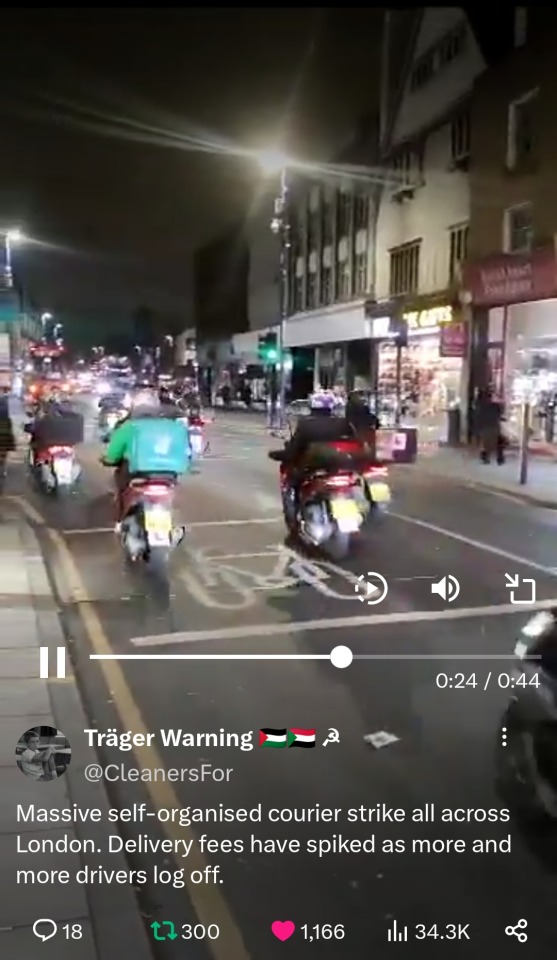
Early this week bike couriers went on strike across London over their unliveable wages and working conditions.
Solidarity!
74 notes
·
View notes
Text
Across New York City, delivery drivers are a ubiquitous sight: congregating outside big restaurant chains waiting to collect orders, zooming through the city streets with orders in tow. “The most chaotic time for deliveries is easily during lunch time,” says Elijah Williams, who delivers food for both Uber and DoorDash. “I’ve had up to four orders at one time.”
Mayor Eric Adams recently announced a major change that will deeply impact busy workers like Williams: app-based delivery workers will be paid $17.96 an hour starting July 12th — and nearly $20 an hour by 2025 — marking the nation’s first minimum pay for such workers.
“Our delivery workers have consistently delivered for us — now, we are delivering for them,” he said. “They should not be delivering food to your household, if they can’t put food on the plate in their household.”
The Background
Mayor Adams made the announcement at City Hall, surrounded by delivery workers as well as members of the nonprofit organizations, Workers Justice Project (WJP) and Los Deliveristas Unidos.
Ligia Guallpa, executive director of WJP, expressed her excitement and gratitude.
“This first of its kind minimum pay rate will uplift working and immigrant families,” said [Ligia Guallpa of Workers Justice Project (WJP)] alongside Gustavo Ajche of Los Deliveristas Unidos. “[It will] ensure that workers who keep New Yorkers fed, are able to keep also their families fed too.”
WJP was founded in 2010, and coordinates numerous worker-led programs, including Los Deliveristas Unidos, that aim to improve conditions for low-wage immigrant workers across the five boroughs.
The Details
The current minimum wage in New York is $15 an hour. On average, service workers are paid $7.09 an hour, excluding tips. The new wage is in keeping with a law passed by the City Council in 2021, which requires the Department of Consumer and Worker Protection to set a standard minimum rate for delivery workers.
App-based delivery workers are classified as “independent contractors,” which means they’re not entitled to the standard minimum wage that applies to salaried employees’ pay. Instead, delivery workers who work for the big food delivery services, like Uber Eats and Relay, are entitled to just $2.13 an hour before tips — a so-called “tipped sub-minimum wage.”
Research has shown that getting rid of tipped sub-minimum wages benefits not just the workers getting the raise, but the economy as a whole. A 2021 analysis found that states without a tipped sub-minimum wage saw 29 percent growth in their leisure and hospitality sectors, compared to just six percent in states that used the federal tipped sub-minimum wage of $2.13.
...For many of the workers who face hostile roads and unpredictable weather conditions to get New Yorkers their ordered goods, this is a life-changing development.
“This is my full-time job. I get up every day and do this,” says delivery driver Justin Martinez outside the Chick-Fil-A in Washington Heights.
Martinez, 30, is originally from the Dominican Republic. His commitment to completing deliveries, he explains, is fueled by his love for his family.
“This is my way to contribute. I go out, 9, 10 hours a day, do deliveries, and then I can come home,” he says. Martinez first started driving for Uber in 2019 before transitioning to delivering food for Uber Eats and other apps in 2021. He’s excited for the pay wage increase: “Maybe now, I only [have to] go out for 6 hours.”
-via Reasons to Be Cheerful, June 30, 2023
#new york#new york city#nyc#uber#ubereats#delivery app#delivery driver#restaurants#minimum wage#labor#labor rights#united states#eric adams#gig workers#gig economy#income inequality#good news#hope
245 notes
·
View notes
Text
Uber and Lyft choose to put thousands out of work rather than pay a minimum wage. The gig economy is impoverishing American workers. Oligarchs and corporate assholes want you to be feudal serfs.
#Uber#lyft#corporate greed#minimum wage#oligarch assholes#corporate ssdholes#gig economy#unionize#organized labor labor now
37 notes
·
View notes
Text
A (Somewhat) Comprehensive List of Fun Job Perks that Won’t Pay Your Rent
Here are some of the super fun job perks the bitchlings told us they’d been offered at a workplace:
free food and beverages
a foosball table
indoor rock climbing wall
on-site laundry services
weekly team happy hours
gym membership or on-site gym
company outings to sports games
company outings to concerts and plays
massage chairs
nap pods
meditation rooms
standing desks and balance ball chairs
the opportunity to volunteer during work hours
automatic vacation day on your birthday
game consoles in the break room
discounts to local stores
unpaid company retreats
a monthly pizza day
performance bonuses paid in alcohol
team building exercises
pet insurance
a commuting allowance
magazine subscriptions
adding work projects to your portfolio
credit to the company store (THIS IS NOT A JOKE)
exposure (NEITHER IS THIS)
a sense of accomplishment (ok this one’s definitely a joke)
Notice anything about the items on this list? As cool as all these job perks might be, not a single one will pay the goddamn rent.
Keep reading.
If you liked this article, join our Patreon!
#benefits#capitalism#gig economy#job perks#job search#perks of the job#unfair hiring practices#workplace benefits
78 notes
·
View notes
Text
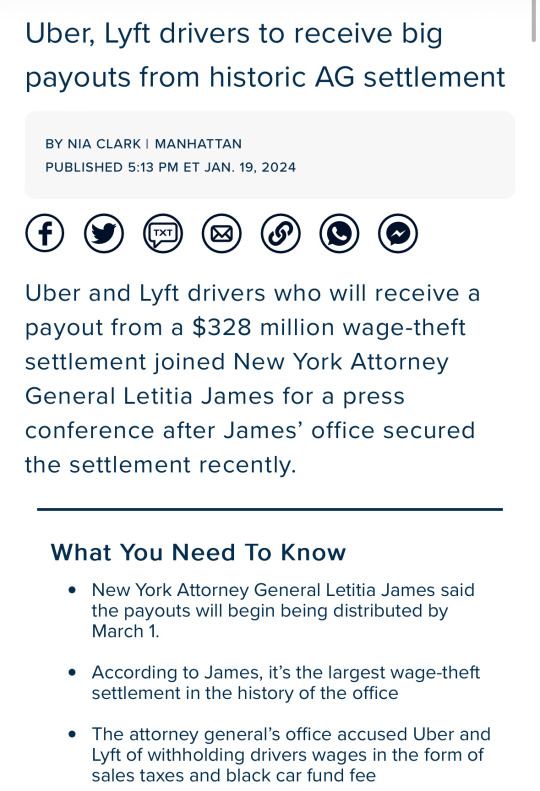
Source
Let’s go
#working class#workers rights#solidarity#government#politics#us politics#the left#progressive#good news#gig economy#labor
360 notes
·
View notes
Text
British Columbia’s labour minister plans to soon pass new laws guaranteeing basic pay, rights and protections for tens of thousands of gig workers.
Harry Bains’s office has launched a call for proposals that could see new requirements placed on companies like Uber, DoorDash and Lyft, whose drivers and delivery workers work without minimum pay, sick leave or other basic benefits.
Bains says new legislation may come as soon as this fall, following years of government promises and months of consultations.
“The goal here is that these workers, like any other workers, they need basic protection when it comes to minimum wage, when it comes to health and safety, and how they are protected when they are injured at the workplace,” Bains said.
Continue Reading.
Tagging: @politicsofcanada
52 notes
·
View notes
Link
Uber was supposed to reduce car ownership, cut traffic congestion, make mobility more accessible for underserved communities, allow its drivers to make a good living, and be complimentary toward transit services—or so Kalanick claimed. It only took a few years for all the big promises to be revealed as overly ambitious at best or outright lies at worst.
Uber’s real impact has been to make life worse for virtually everyone it touches. A series of studies have found the company made traffic worse in major cities, did little to affect car ownership, took passengers away from transit services, and increased trip emissions. Meanwhile, it decimated the conditions of existing taxi workers and squeezed its own drivers (who mainly hailed from marginalised communities) to disproportionately serve affluent young people living in cities.
The big promises and uncritical coverage served as a cover for the company’s real project: to deregulate the taxi industry, chip away at the rights of workers, and increase corporate control over how people get around. In short, it succeeded where a 1990s campaign funded by the Koch brothers had failed. The real benefits accrued not to the public whose streets were flooded with unregulated taxis or workers whose livelihoods evaporated, but to Uber’s early investors who were still able to cash out when the company went public and to other companies dubbed ‘Uber for X’ that were able to spread its piece-work labour model to other sectors.
5K notes
·
View notes
Text
Why You Should Rethink DoorDash, and Other Courier Apps: From a Driver Based in the USA
So this is part rant and part psa. I have been doing delivery work as a gig driver for DoorDash for years bc of various personal circumstances. I'm hoping to get a CDL in the near future so I can move on to a better job, but that's besides the point for right now. Further disclaimer: I only know the intricacies of DD. I do not know how precisely GrubHub, Uber Eats, etc, work, but I presume they work much the same, since I see the same complaints come from those services too.
This is in no particular order but please, if you have the time, please read it through. I'll preface this by saying I am not going to be rude or bitchy about customers or merchants here, this isn't just me whining, I'm just trying to give a level recount of my experiences with DD, and often, they are just... Not great experiences, unfortunately.
I don't know how many people realize this, but drivers get offered a base pay of $2.00-$2.50 per delivery, depending on the area. This is all DoorDash HAS to pay a driver. Every time you submit an order via DD, it gets spit out onto drivers' apps with that base pay + tip displayed. Meaning if you do not tip, every driver sees only $2-$2.50 to deliver your order. Sometimes, if enough drivers decline an order enough times, the DD algorithm will start to slowly raise the base offered pay... by about $0.25-$1 per round depending on the mileage it takes to deliver that order. This means if you do not tip, your order will most likely be extremely delayed, or bundled with another order, which will make it late, and your food cold.
**Emphasizing this: although I find low tips frustrating, I am NOT personally faulting anyone for not tipping.** DD should just pay their drivers, and it shouldn't be up to you, especially bc ordering delivery is so damn expensive. But I'm telling you this bc they certainly don't advertise it, and many people in my experience are shocked by now little it pays. Many drivers will not accept an offer that's less than $1-$1.50/mi. This means if your restaurant is 8mi away from you, and DD pays the minimum $2, you need to be tipping at least $6-$10 for most drivers to even consider it, or else it will be sitting for a long time or get bundled with a double delivery (more chances for mistakes + takes longer for the food to get to you).
Furthermore, in certain localities, DD offers an hourly rate for its drivers. This sounds good on paper, but keep in mind that this does not include gas money, and only accounts for the time from a delivery being accepted to the time it is dropped off. If you are delivering in suburbs or, god forbid, rural areas, you will spend a lot of time not making money but still burning gas returning from a home to where restaurants are so you can get your next delivery. While the app may say something impressive like $14-$17.25/hr, in reality, it's usually half that or less when you factor in downtime.
DD orders are also exorbitantly more expensive than if you buy directly from the merchant because DD charges the merchant 15-30% of the menu price to use their platform, and the merchants pass this on, usually plus a little extra, to you. This is before you even consider "delivery fees," which are not paid to drivers and are pretty much exclusively pocketed by DD. Also, DD will often choose a store farther away from you (so, say, a McDonald's that's 5mi away from you as opposed to the one that's 1mi away) specifically so they can charge more on fees. *Sometimes* this is just bc the closer store isn't enrolled in DD, but oftentimes, it isn't.
ADDENDUM ON THIS, HOWEVER: If you are ordering directly from a merchant that you know does not have actual in-house drivers, but is offering delivery anyway, like Wendy's or McDonald's, understand that these merchants are going to send these deliveries through to DD or Uber Eats. These orders have cryptic names for items on the Dasher's end and often we cannot contact you if there's an issue with your order, because the phone numbers provided to the Dasher's app never work. If you know for certain the merchant has its own delivery team (most pizza places, Chick-fil-A, Panera, etc), please order delivery directly through them, but if you know they do not (Wendy's, McDonald's), DO NOT ORDER delivery through their apps. It displays poorly on the drivers end and is often more expensive and a less ideal experience for you.
DD does offer DashPass, a subscription service that, for $9.99/mo, says it slashes delivery fees and other costs. Not really; the amount you pay in DashPass, especially the longer you have it, often exceeds the fees you would pay if you simply bought orders without DashPass. Also, it will advertise at you constantly via notifications and emails which will make you more likely to spend more on delivery that you wouldn't have in the first place, further eroding whatever savings you'd gain from DashPass.
DoorDash also can do a thing where they enroll stores in their platform without that store's permission. These orders require Dashers to use a red card, a notoriously buggy debit card that is supposed to get loaded with the amount of money it takes to cover the order by DD. The restaurants do not get any extra profits from these, and many store managers would love to prevent this from happening, but it requires legal action that is infeasible for most stores to do on their own. This causes friction and conflicts between store managers and drivers, delays for the customers, and solely profits DD.
DD ***does not*** reimburse for any amount of gas or car repair costs. Instead, they offer a company debit card which has tons of hidden fees for their drivers, and gives a small % cashback on gas. It is an overwhelmingly bad deal, but they use it as a shield against accusations that they don't support drivers against the cost of gas. They do...but only if you let them be your bank. Otherwise, you get your pay the Tuesday after the week you worked, or you can cash out immediately via the FastPay feature - for a $1.99 fee out of the money you earned.
DD support teams (and I know this is not unique by any measure to DD but it feels worth mentioning) are based in Taiwan, I believe, as well. I have absolutely nothing against the support teams, for they are doing the best with what they have, but DD absolutely weaponizes language barriers and the difficulty in communication to try to silence customers and dashers alike when there is a problem. DD seems to hope that if you get frustrated enough trying to talk to support (once again, not the workers' faults, the call center is absolutely being exploited too, I just don't have firsthand enough experience with that work to talk about the specifics of how), you will simply give up and not bother trying to seek a refund or half pay.
On that note, if a delivery has to be canceled for whatever reason, your driver will not get paid regardless of the time they spent on it. Very very rarely they will give "half pay," which is half of the promised payout, but only if you were on the delivery for an excessive length of time (i.e., 1+ hours).
Furthermore, if a delivery is marked as undelivered, DD will issue a contract violation against the driver. It is then up to the driver to submit proof that they completed the delivery, via pictures or video evidence, even though DD tracks our phones the entire time we are delivering and should be able to see if we were there or not. **New drivers are not properly warned about this,** so oftentimes when you have a "hand it to the customer" delivery, drivers don't think to take pictures or videos, and dashcams are expensive, not everyone has one. It is extremely hard to argue your way out of a contract violation if you do not have proof.
If you get 3 or more contract violations, you will be immediately suspended from the platform, and 2 puts you at risk of it. If you complete 100 deliveries without incident since the one that gave you the violation, it *will* just go away... But this is a subtle tactic used to scare drivers into taking more (usually very badly paying) orders, because they fear deactivation.
I'm not saying that you shouldn't try to get a refund, if you legitimately did not receive your order. But please, try contacting your driver directly before you contact support, and if you must contact support, really consider whether someone losing a job, even if it a side gig, is worth the amount of money you spent. You can often just lie and tell DD the order is completely wrong and they'll refund it without punishing the driver, as that's seen as a merchant error.
Also, I don't think many customers realize this: we CANNOT see delivery instructions before we accept a delivery, and they are difficult to see until after the delivery is picked up (as they are only available on a floating widget badge). If you ask for extra sauces or other things in the delivery instructions, 9 times out of 10 we will not see it until we are already on the road and headed to you. Please don't hate drivers for this; most of the drivers I've seen are more than happy to do whatever you want! But msg us via the app, DO NOT use the delivery instructions. Delivery instructions is for instructions on how to find your house or apartment if the numbers aren't very visible, or telling us to call you instead of come to your door when we arrive, that sort of thing. In fact, please be as descriptive as possible for the delivery instructions on this front- if you're ordering from a business, tell us the business name. If you're ordering from an apt, tell us the apartment complex name. If you're ordering from a house, tell us the color of your house or the cars in the driveway. It's all very helpful!
One last thing before I wrap this up: safety. Delivering is an extremely dangerous job. Pizza delivery, for example, is one of the most dangerous professions, and DD's safety features are even worse than those places. DD has implemented a feature for you to contact 911 via the Dasher app in emergencies, but often, this would still be too late. DD does NOT vet the areas for safety that they release the platform into, and there is no real recourse for violent customers aside from talking to support, which takes time and often won't communicate the issue effectively. Sometimes this works, and customers will rarely get banned from Doordash if they threaten, harass, or injure a driver. But the vast majority of these cases go unreported.
Loose dogs and carjacking are also major problems. Customers failing to notify other people in their households that they ordered delivery has led to me being threatened before. I've had people answer the door in their underwear. I had someone try to invite me into his house while wearing nothing but briefs. I had someone step out of their pickup truck carrying two rifles directly in front of me right before I delivered to their house once. I've had dogs nearly bite me - thankfully none have, I'm luckier than many others, but it's still a significant risk. A lot of people seem to trust their dogs when they really should not.
All of this, for $2.25 in base pay + a few dollars in tips.
I really do love delivering, and I do appreciate the freedom DD gives me in choosing my work schedule right now. However, the compensation is woefully bad, the company scams merchants, customers, and drivers alike, and the working conditions are very unsafe.
Idk how many people here really use DD, or what in particular can even be done about most of these issues, but I hope this enlightened some folks.
44 notes
·
View notes
Text
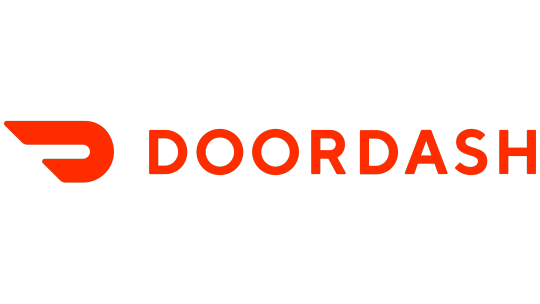
When people say the gig economy is fucked, they may not be able to put it enough into persepctive for those outside of that sphere to understand.
Let me paint you a picture.
My partner and I just dashed for about 2 hours. Drove through snow and high winds. Dealt with grumpy retail employees. Navigated the hell that is city-downtown driving. ALL on Black Friday, the day that's supposed to be highest-paying.
Guess how much we made.
I'll wait.
○ ○ ○
$12.
That's it. $6/hour. McDONALD'S pays more than that. More than double, in-fact (at least in NYS).
Uber, doordash, instacart, all these businesses that tout themselves as helpful to the entrepreneurial spirit-- they're all lying to us.
They're using every old excuse in the book to not properly compensate their workers, then crack down on the organizations that could ACTUALLY help them, like unions.
Don't be fooled by propoganda.
Corporations are NOT our friends. Fight for your rights.
#gig economy#uber#doordash#instacart#gigs#economics#us econony#unionizing#workers unite#workers rights#workers rise up#we're fucked if we don't work together#yes we can#fight for whats right#justice#social justice#unions need a comeback#labor rights#labor unions#power to the people#eat the rich#give me liberty or give me death#no taxation without representation#workers#laborers#fight back#fight for the future#black friday#cyber week
23 notes
·
View notes